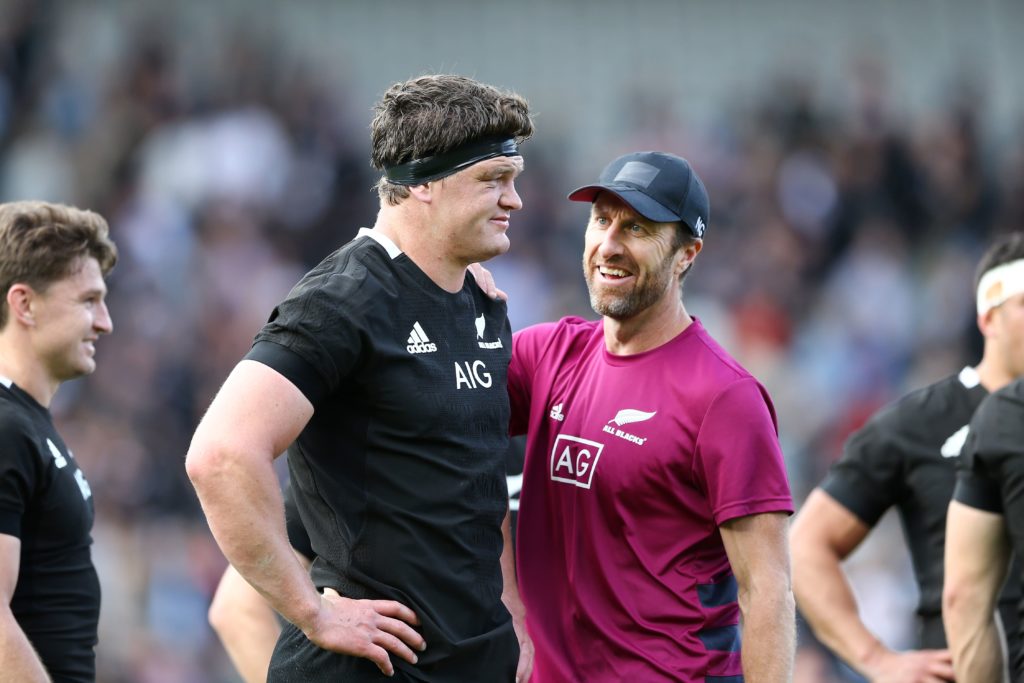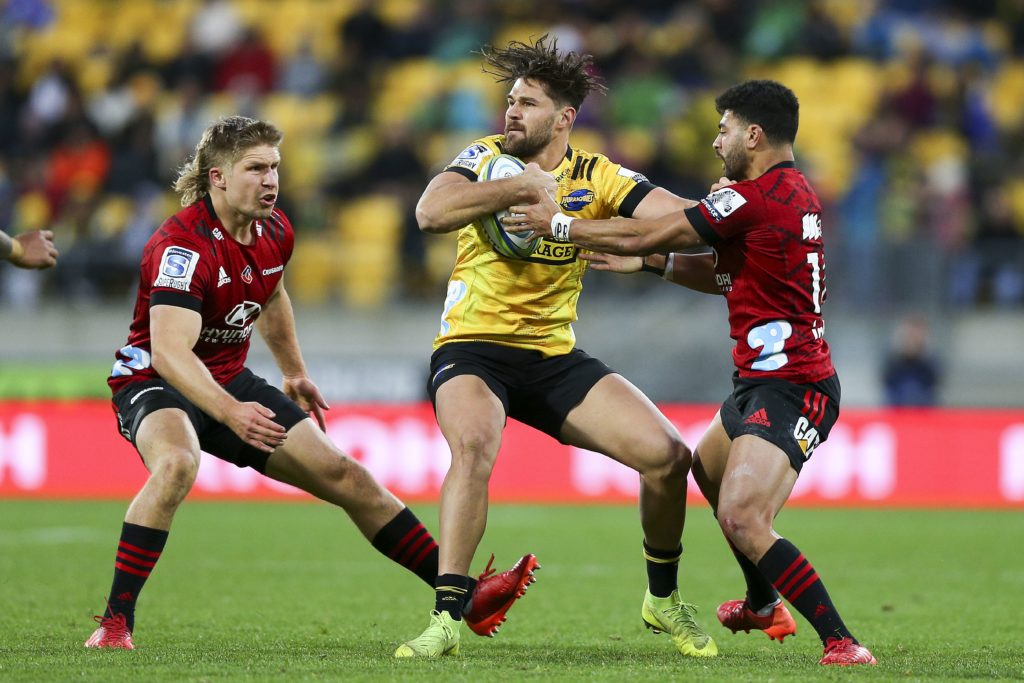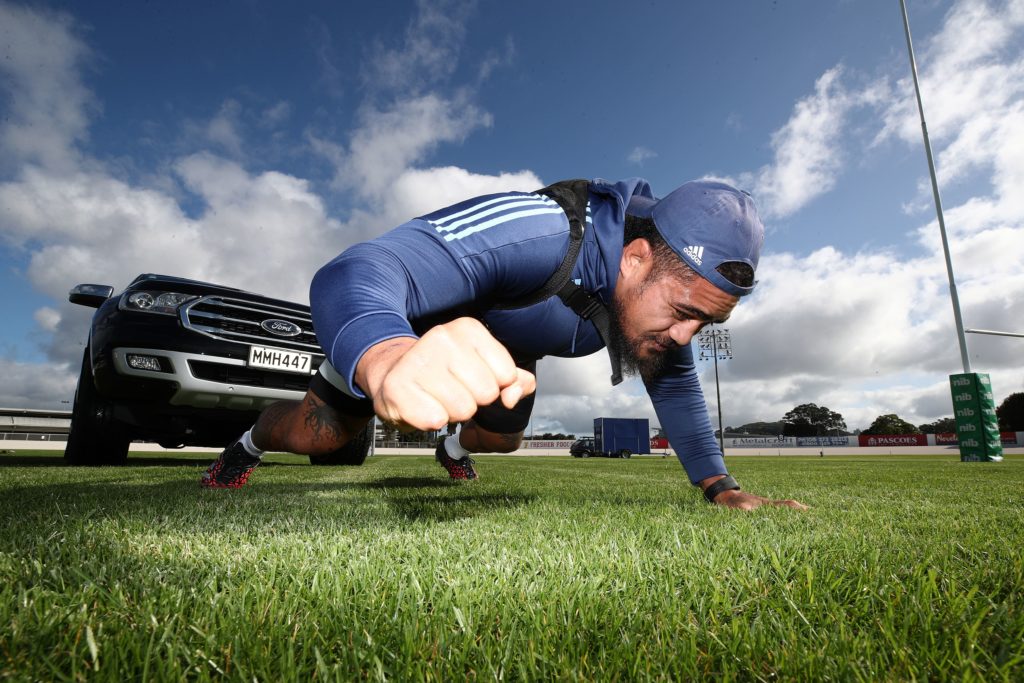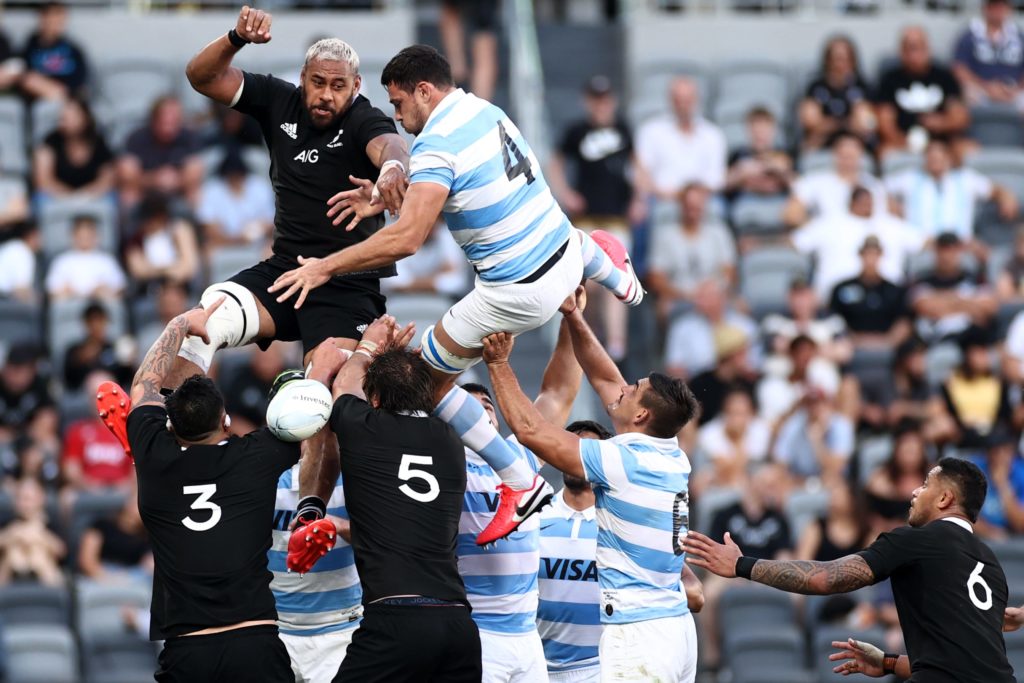Super Rugby Aotearoa, brutal and beautiful in equal measure as New Zealand’s best go at it in a meaningful and easy-to-understand competition, could be extended this year into an even more arduous tournament for the players.
The trans-Tasman competition scheduled to follow SRA is likely to be cancelled due to Covid, which will probably mean an extra four games or so of derbies for each Kiwi franchise; good news for crowds in New Zealand and viewers around the world, but maybe less so for those in the firing line and possibly All Blacks coach Ian Foster, who may be picking up the pieces afterwards.
But in an interview with The XV, All Blacks head trainer Nic Gill, a relentlessly positive individual and one who is entering his 14th year with the team, believes the players will cope okay if they are looked after via a rest week before they do battle again and says the top players’ energy levels at the end of last year’s Rugby Championship in Australia indicated that surviving Super Rugby Aotearoa was achievable.
Last year’s competition was more intense, but it didn’t have the inter-continental travel of previous competitions (although the Blues did travel to South Africa for Super Rugby last year before it was cancelled due to Covid). That, combined with the All Blacks not having to travel to South Africa and Argentina for the Rugby Championship and backing it up with a trip to the Northern Hemisphere as they usually do meant New Zealand’s top players finished the year relatively fresh in a physical sense if not a mental one.
“Before Super Rugby Aotearoa it was pretty common knowledge that the derbies were the toughest games and the games against the other teams; the South African or Australian or Argentinian teams were perceived to be a bit easier than the others,” Gill says.

“So the fact you had local derbies week in and week out made it pretty tough on the players physically. And every game was so important in the context of the competition that players were playing big minutes and each team was trying to have their best team out there for 80 minutes. In terms of injuries, there wasn’t a huge significant change. We had some more severe injuries but whether that’s any different to previous Super Rugby competitions I’m not sure.
“On the whole the players were really good. Say the Crusaders are in a Super Rugby final. They normally come into the All Blacks on the Wednesday after that final and we’ve got a game the week after. The players are generally a write-off. Super Rugby Aotearoa was a short competition. It was intense but it was short. I think the intensity and duration of the competition definitely didn’t result in a more weary player.
“The All Blacks came in and there was so much novelty to the year that there was no boredom factor, no monotony. Every week was, ‘We don’t even know what we’ve got. We don’t know if we’ve got camp next week because we don’t know what’s happening with Covid. We don’t know if we’re in Aussie and if we are in Aussie we don’t know if we’re there for two months or three weeks.’
“Mentally there was probably quite a bit of uncertainty and stress but physically through the year the guys were getting better. There was no noticeable downturn post-Super Rugby Aotearoa.”
Before Super Rugby Aotearoa it was pretty common knowledge that the derbies were the toughest games and the games against the other teams … were perceived to be a bit easier.
Nic Gill
Of the prospect of an extended Super Rugby Aotearoa competition, Gill said: “I think the people controlling the tournament will consider the intensity of the competition and the duration. If that does happen then there will probably be a rest week before that third round starts, or something like that. And really, if we take learnings from last year’s Super Rugby Aotearoa competition such as we need to look after our players because the intensity is brutal then there will be a few of us with crossed fingers but it’s no different to any other year, really.
“I’d say less,” Gill replied when asked about the top players’ workloads last year. “In terms of games there were five or six games of Super Rugby and about seven or eight in Super Rugby Aotearoa [each franchise] and the international window was totally compromised.
“You probably had fewer games for the top players and while some people might argue that the intensity was higher in Super Rugby Aotearoa, we didn’t have the same tests for the top tier and nor did we have the international travel which really stuffs you around; teams weren’t going to Africa during Super Rugby Aotearoa and the All Blacks weren’t going to Africa and Argentina and then going to the UK. For that top tier of players, while they would have loved to have been travelling, it’s definitely taken a little bit of load away from them. And you had five or six rounds of Super Rugby and then a little off-season with a month’s lockdown.
“The All Blacks, at the end of that Rugby Championship in Australia, they weren’t running out of puff that’s for sure and I think the last game showed that – physically we were definitely going good.”
All of which is good news for everyone and if that trend continues the All Blacks may get to the World Cup in France in 2023 (should it go ahead as planned) and be thankful for Covid’s intervention. It was a re-set which forced New Zealand to do things a little differently and in many ways for the better; that hasn’t applied to Northern Hemisphere clubs and nations who are grinding on regardless.

For now, a change in New Zealand Rugby policy will make many supporters of the game here happy for a different reason.
No longer will NZR dictate that Super Rugby coaches follow a strict 40-minute, 60-minute, 80-minute graduated return to play policy for their top players at the start of the competition. Instead, there’s a far more collaborative approach in the knowledge that every player is different, an understanding that will ease a previous frustration for many coaches.
“If you don’t play rugby for 12 weeks and then play 80 minutes then your risk of injury is very high,” Gill says. “We’ve tried to have a graduated return to playing full games. What we’ve been working hard on with the clubs over the last two years is trying to figure out how we can do it on a more individual level.
“What’s happening this year is that players are available for the last pre-season game, which is their introduction to rugby – 40 minutes – and then it’s the clubs who are going to be able to manage their top players through a collaborative process through New Zealand Rugby.
The All Blacks came in and there was so much novelty to the year that there was no boredom factor, no monotony. Every week was, ‘We don’t even know what we’ve got. We don’t know if we’ve got camp next week because we don’t know what’s happening with Covid.’
“The 40-, 60-, 80- [minute rule] was a guiding principle because it’s obviously very hard to gradually let the players out there for a full game. But the feedback that’s been given, and in talking to players and Super clubs, is that for some players that’s perfect and for other players that’s not.
“Other players can get away with playing 40 minutes and then 80 not a problem. The word ‘collaborative’ is probably a key word there. The Super coaches and the All Black coaches and high performance team at NZ Rugby are talking about the top players and how best to ensure they can play their best footy for the whole 10-month season.”
Auckland’s recent brief return to a level three Covid lockdown would have brought back some unpleasant memories for the Blues coaching and playing staff in particular. For three days they couldn’t train together and so were left to their own devices (albeit via a programme) and it meant the pre-season game against the Crusaders at Eden Park was cancelled (just as the round robin fixture at the same venue was last year). Making it more difficult would have been the knowledge that other Kiwi franchises could operate far more closely to normal as the days to the start of the competition ticked by.
Speaking to The XV while the Blues were still in lockdown, Gill said: “The positive is they have been here before last year. I think the fact that the players and staff have experience with this helps a little bit, but it’s far from ideal is it?”
The pictures of Blues and All Blacks prop Ofa Tuungafasi supplementing his training by donning a harness and pulling a Ford Ranger ute were some of the most enduring images of last year’s lockdown and, like, quarantine for the All Blacks last December when they arrived back from the Rugby Championship, it affected individuals in different ways.

“The fact that we had that break in rugby and people were at home for a month changed the dynamic quite a lot in terms of what guys could and couldn’t do,” Gill said of New Zealand’s first lockdown last March.
“Different players were prepared differently for the home situation – some guys had weights and some didn’t, for example – but generally the professional players all used that time to train well and their clubs all had programmes running. They navigated that well. We basically had three weeks to get them ready for rugby and we had national calls with all staff from the clubs.
“I had all the conditioning staff together on calls and we all tried to help each other try to get ready for Super Rugby Aotearoa in three weeks. There was really good collaboration across the clubs; it was so new to all of us. Everyone getting through as well as possible was in the best interests of the competition … [because we] had to go from being at home for a month to playing your enemy three weeks later.”
Gill was proactive in mitigating against the affects of his players being shut away in quarantine by ensuring they had exercise equipment such as a rowing machine or stationary bike in their hotel room.
Not surprisingly, he said being locked away for a fortnight was still a difficult experience.
“It was challenging for different people for different reasons,” he says. “Probably the hardest thing for some was being home in New Zealand and some of the Aucklanders’ families being two or three kilometres away and they weren’t able to see them. It was a bit cruel. I think the fact we had exercise gear helped a lot. For me personally I got all my work done so that when I went home I could be at home with my family and not be working.
You probably had fewer games for the top players and while some people might argue that the intensity was higher in Super Rugby Aotearoa, we didn’t have the same tests for the top tier and nor did we have the international travel which really stuffs you around.
“It was pretty tough though mate, you get sick of your own voice in your head sometimes but Zoom is amazing and you can connect and interact with people, although it’s not the same. A few guys did some crazy challenges. Some people rowed a marathon over a day, Sammy Whitelock and I biked the length of New Zealand over the two weeks. You had people trying to do as many press ups as they could. Codie Taylor did a fundraising gig – I think he did 12 hours of cycling [in a day]. All the boys got into that and they raised about $10,000. People were a little bit creative in their own way to try to pass the time.”
While helping the Kiwi Super Rugby trainers prepare for the upcoming competition, Gill is in the same boat as everyone else as far as the All Blacks test programme this year is concerned. If doubt surrounds what Super Rugby Aotearoa will look like in 2021, the likelihood of Italy and Fiji touring in the middle of the year, and where and when the Rugby Championship will be held, is the proverbial riddle wrapped in an enigma. And that’s before we consider whether the All Blacks will tour the United Kingdom in November as is hoped.
“It’s a wait and see thing isn’t it? Gill says. “I think everyone would have learned a lot from their experiences last year. It’s highly likely that it’s not going to be a normal year and what we had planned to be doing as an All Black team is likely to be very different to what happens.

“We don’t know how quickly vaccines change the environment around the world. We don’t know what New Zealand’s regulations or restrictions on teams coming here will be. There’s so much up in the air. What we do know is that there’s an awesome Super Rugby Aotearoa competition about to start and at the end of that hopefully we have some international rugby to play.
“No doubt we will, it’s just a matter of who, when and where. At the very least hopefully we’re playing the Wallabies and Argentina and South Africa in New Zealand or Australia or both. By the time we get through that hopefully things in the Northern Hemisphere have changed too.”



Comments
Join free and tell us what you really think!
Sign up for free